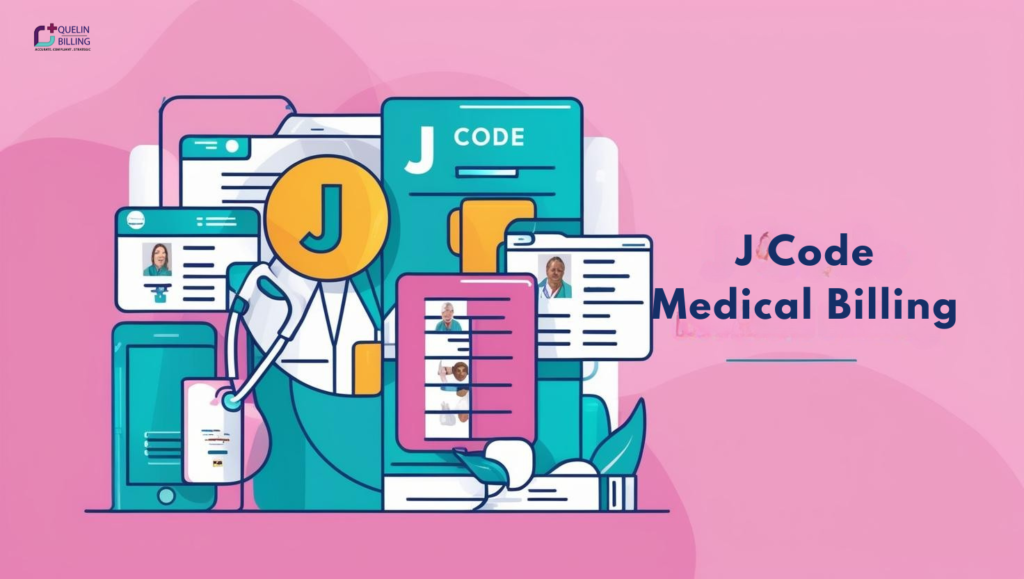- Quelin Billing LLC
What is J-Codes in Medical Billing?
Ronnie S
January 2, 2025

Efficiency is of great importance in the fast-paced world of medical billing. Patients come and get medical procedures on an emergency basis. Each minute is important, and the more time you save, the faster your claim will be processed. It means cash flow is improved and patients are much more satisfied with the overall experience. One important step that can significantly boost your efficiency is authorization before you embark on the procedure. A professional company will ensure that your approvals are taken so that the process of hospitalization becomes easier and smoother.
When the patient’s insurance company gives approval before a medical procedure, it becomes much more seamless. Authorization is the process of obtaining approval from a patient’s insurance company before providing certain medical services or procedures. It is therefore referred to as pre-authorization. It ensures that the insurance plan covers the service and outlines the specific details, such as the number of treatments allowed or pre-approved medications.
In the world of medical billing, J-code play a pivotal role, particularly for billing injectable drugs and certain medical substances. For healthcare providers and billing professionals, understanding J-codes is key to accurate claims submission and optimal reimbursement.
J-codes are a specific subset of the Healthcare Common Procedure Coding System (HCPCS) Level II codes. These alphanumeric codes, beginning with the letter “J,” are used to represent:
• Injectable drugs administered by healthcare providers.
• Certain immunosuppressive agents, chemotherapy drugs, and other non-oral medications.
For example:
• J9035: Injection, bevacizumab, 10 mg, typically used for cancer treatment.
• J1885: Injection, ketorolac tromethamine, per 15 mg, for pain management.
These codes ensure standardized documentation and reimbursement for specific medications.
Learn More About J-Codes
J-codes are vital for:
• Insurance Claims: Facilitating accurate billing and processing by payers.
• Compliance: Ensuring adherence to regulatory requirements for drug administration.
• Cost Tracking: Providing transparency in healthcare costs related to medication.
Each Jcode corresponds to a specific drug and dosage, making it essential to use them accurately to avoid claim errors or denials.
How to Submit Claims with J-Codes
HIPAA mandates that all medical facilities providing services or supplies adhere to a standardized coding system for claims processing. J Codes in medical billing are a part of this system, specifically used for drugs administered by healthcare professionals. These codes do not apply to medications that patients self-administer or purchase independently, including both prescription and over-the-counter drugs.
To ensure accurate claims, physicians must provide detailed and correct information when administering injectable medications in their facilities. J-Codes fall under Level II HCPCS codes, which are composed of five characters: one letter followed by four numbers. Each J-Code represents a specific drug and its dosage, which may be identified by either a generic or product-specific name.
It’s essential to note that J-Codes might not cover immunization drugs. In such cases, the billing should include the CPT code corresponding to the physician’s procedure. For example, consider a patient with rheumatoid arthritis requiring a 20 mg injection of adalimumab. As a practitioner, you would locate the appropriate J-Code—J0135—which denotes “injection, adalimumab, 20 mg.” This code must be used as the HCPCS Level II code when submitting claims to Medicaid, Medicare, or other insurance providers that process HCPCS codes.
Accurate coding ensures compliance with regulations and facilitates timely reimbursement.
How to Ensure Correct J-Coding
Accurate J-coding is crucial for reimbursement and compliance. Here are some best practices:
• Stay Updated: HCPCS codes are revised annually. Ensure you’re using the latest codes.
• Review Payer Policies: Different insurance companies may have unique rules for J-codes.
• Double-Check Dosages: Match the administered drug dosage with the corresponding J-code to prevent discrepancies.
• Train Staff: Provide ongoing training to billing staff on J-code updates and guidelines.
Types of J-Coding
J-codes cover a wide range of injectable drugs and substances. Some common categories include:
1. Chemotherapy Drugs
Example: J9041: Injection, bortezomib, 0.1 mg.
2. Pain Management
Example: J1885: Injection, ketorolac tromethamine, per 15 mg.
3. Immunosuppressive Agents
Example: J7507: Tacrolimus, extended-release, per 1 mg.
4. Biologic Therapies
Example: J2357: Injection, omalizumab, 5 mg, for asthma and chronic hives.
5. Miscellaneous Drugs
o Example: J3490: Unclassified drugs.
How Quelinbilling Can Help
Navigating the complexities of J-codes can be daunting, but Quelinbilling is here to help. Our team of experts specializes in:
• Accurate Coding: Ensuring correct J-coding for all claims.
• Claims Submission: Streamlining the process for faster reimbursements.
• Compliance: Staying up-to-date with the latest regulatory changes to minimize denials.
Why Choose Us?
• Expertise: Years of experience in medical billing for various specialties.
• Tailored Services: Customized solutions to fit your practice’s unique needs.
• Results-Driven: Dedicated to maximizing your reimbursements.
Ready to simplify your medical billing? Contact Quelinbilling today to learn more about our comprehensive services and how we can assist with J-code billing and beyond.
Have Any Question?
Reach out to Quelin Billing for expert assistance in medical billing, coding, and practice management, tailored to your healthcare needs.
- 210-245-7698
- Contact@quelinbilling.com





